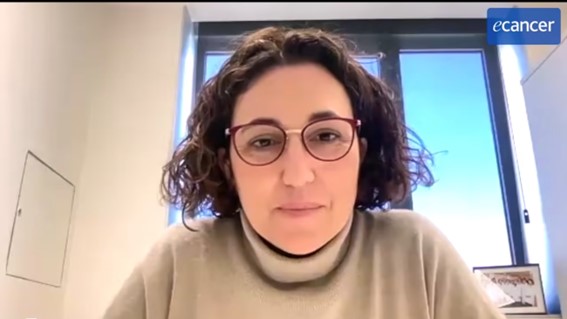This month celebrated the 45th annual San Antonio Breast Cancer Symposium® (2022 SABCS®), December 6-10, in San Antonio, Texas (USA). Among the many studies that made headlines during the meeting were primary results of the multicenter international POSITIVE study (1) and data from the phase II SERENA-2 randomized, multi-dose clinical trial (2), both of which were selected for the 2022 SABCS® media program.
Pregnancy Outcome and Safety of Interrupting Therapy for women with endocrine responsIVE breast cancer: Primary Results from the POSITIVE Trial
Coordinated in Spain by the SOLTI Breast Cancer Research Group and GEICAM Spanish Breast Cancer Group, the POSITIVE study is co-led by Cristina Saura, Principal Investigator of the Vall d’Hebron Institute of Oncology’s (VHIO) Breast Cancer Group.
The investigators, led by Ann Partridge, Vice-Chair of Medical Oncology, Director of the Program for Young Women with Breast Cancer, Dana-Farber Cancer Institute, Boston (USA), and Olivia Pagani, POSITIVE Study Chair on behalf of the International Breast Cancer Study Group (IBCSG), assessed pregnancy outcomes and the safety of temporarily stopping endocrine therapy in young women with hormone receptor (HR)-positive breast cancer wishing to become pregnant.
 In an invited interview with the oncology channel ecancer, co-author Cristina Saura, Head of the Vall d’Hebron University Hospital’s (HUVH) Breast Cancer Unit, and a member of SOLTI’s Board of Directors, discusses the initial results of this pioneering study that enrolled over 500 women aged 42 or younger with HR+ breast cancer who wanted to become pregnant. Specifically, Cristina talks about the background of this international, prospective single-arm trial that was designed to test the hypothesis of temporarily interrupting endocrine therapy in patients pursuing pregnancy, discusses the enrolment criteria, and highlights the primary endpoint of the study which was a breast cancer free interval for these patients.
In an invited interview with the oncology channel ecancer, co-author Cristina Saura, Head of the Vall d’Hebron University Hospital’s (HUVH) Breast Cancer Unit, and a member of SOLTI’s Board of Directors, discusses the initial results of this pioneering study that enrolled over 500 women aged 42 or younger with HR+ breast cancer who wanted to become pregnant. Specifically, Cristina talks about the background of this international, prospective single-arm trial that was designed to test the hypothesis of temporarily interrupting endocrine therapy in patients pursuing pregnancy, discusses the enrolment criteria, and highlights the primary endpoint of the study which was a breast cancer free interval for these patients.
Upon her discussion of the results, she suggests that their reported data could have a significant impact on how to advise this patient population and discuss possible treatment pathways based on the specificities of each individual patient’s disease and other considerations such as reproductive status and age.
She also highlights that the main limitation of this study is the short follow-up of 41 months. To assess the risk of disease recurrence over time, the POSITIVE investigators continue to follow-up the study participants to corroborate their data in the long-term.
To access this ecancer interview with Cristina Saura, please click here.
—–
Camizestrant, a next generation oral SERD vs fulvestrant in post-menopausal women with advanced ER-positive HER2-negative breast cancer: Results of the randomized, multi-dose Phase II SERENA-2 trial
Also making headlines during 2022 SABCS® were results of the phase II SERENA-2 clinical trial that evaluated the next-generation oral selective estrogen receptor degrader (SERD) camizestrant versus fulvestrant in patients with estrogen receptor-positive, HER2-negative breast cancer.
Presented by Mafalda Oliveira, Senior Consultant at the Vall d’Hebron University Hospital’s Medical Oncology Department and Clinical Investigator of the Vall d’Hebron Institute of Oncology’s (VHIO) Breast Cancer Group, data showed that in the overall population, camizestrant significantly reduced the risk of disease progression or death and point to this oral SERD as a promising contender in improving currently available endocrine therapies for patients with ER-driven breast cancer.

In her interview with ecancer Mafalda Oliveira, international coordinator of SERENA-2 and co-developer of this novel agent, discusses the design of this study evaluating different doses of camizestrant versus the current standard of care fulvestrant in patients with ER+ HER2- advanced breast cancer who had received and progressed to prior endocrine therapy.
Summarizing the results, Mafalda concludes the interview by outlining next steps, with camizestrant now being tested in two pivotal phase III clinical trials, both in combination with a CDK4/6 inhibitor, and highlights how results of SERENA-2 could impact the future treatment of this patient population.
To discover more please click here.
###
References:
- GS4-09 – Pregnancy Outcome and Safety of Interrupting Therapy for women with endocrine responsIVE breast cancer: Primary Results from the POSITIVE Trial (IBCSG 48-14 / BIG 8-13). Partridge AH, Niman SM, Ruggeri M, Peccatori FA, Azim Jr HA, Colleoni M, Saura C, Shimizu C, Sætersdal AB, Kroep JR, Mailliez A, Warner E, Borges VF, Amant F, Gombos A, Kataoka A, Rousset-Jablonski C, Borstnar S, Takei J, Lee JE, Walshe JM, Ruiz Borrego M, Moore HCF, Saunders C, Bjelic-Radisci V, Susnjar S, Cardoso F, Smith KL, Ferreiro T, Ribi K, Ruddy KJ, El-Abed S, Piccart M, Korde LA, Goldhirsch A, Gelber RD, Pagani O (Presenting Author). POSITIVE Investigators, International Breast Cancer Study Group (a division of ETOP IBCSG Partners Foundation) Alliance for Clinical Trials in Oncology, Breast International Group, U.S. NCI National Clinical Trials Network.
- GS3-02 – Camizestrant, a next generation oral SERD vs fulvestrant in post-menopausal women with advanced ER-positive HER2-negative breast cancer: Results of the randomized, multi-dose Phase 2 SERENA-2 trial. Oliveira M, Pominchuk D, Nowecki Z, Hamilton E, Kulyaba Y, Andabekov T, Hotko Y, Melkadze T, Nemsadze G, Neven P, Semegen Y, Vladimirov V, Zamagni C, Denys H, Forget F, Horvath Z, Nesterova A, Bennett M, Kirova B, Klinowska T, Lindemann JPO, Lissa D, Mathewson A, Morrow CJ, Traugottova Z, van Zyl R, Arkania E.











